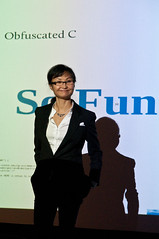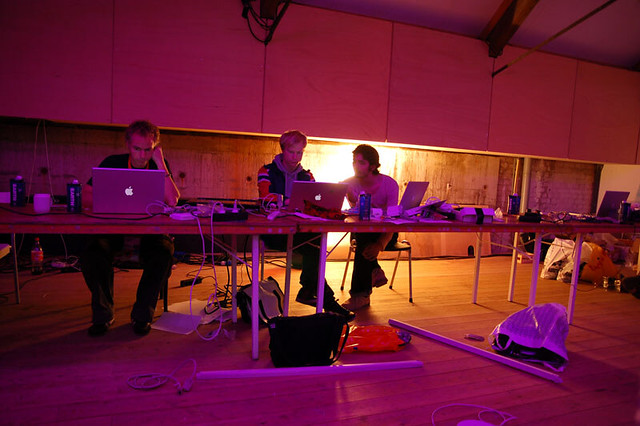This series of reports on the Software Fun (Funware) symposium held on November 27, 2010 at Baltan Laboratories were commissioned by Baltan and MU.
 Part 2 in a short series on the Software and Fun (Funware) symposium at Baltan Labs. Wendy Chun and Andrew Lison talked about the slippery boundary between fun and obsession in programming. The boundary is crossed when it’s so fun that it’s not fun anymore. Fun is a battlefield, a (pleasurable) struggle that has everything to do with Tiziana Terranova’s notion of Free Labor. The difference between programmers and users is gradually eroding: programmers have become more empowered and disempowered. It has become fun. Making programming more democratic has led to the dissemination of programmers.
Part 2 in a short series on the Software and Fun (Funware) symposium at Baltan Labs. Wendy Chun and Andrew Lison talked about the slippery boundary between fun and obsession in programming. The boundary is crossed when it’s so fun that it’s not fun anymore. Fun is a battlefield, a (pleasurable) struggle that has everything to do with Tiziana Terranova’s notion of Free Labor. The difference between programmers and users is gradually eroding: programmers have become more empowered and disempowered. It has become fun. Making programming more democratic has led to the dissemination of programmers.
Joseph Weizenbaum described the programmer as God: “The computer programmer is a creator of universes for which he alone is responsible. Universes of virtually unlimited complexity can be created in the form of computer programs.” Source code is doing as it says as the computer programmer is a creator of universes. Programming cannot know the final path of its program. Chun describes hackers as compulsive gamblers. Both hackers and gamblers entail megalomania and do it for a pleasurable drive of reassurance. Programmers strive for power instead of truth: knowledge is never enough because bugs always appear. Weizenbaum describes the work of these highly driven or “compulsive” programmers in Science and the Compulsive Programmer
bright, young men of disheveled appearance, often with sunken glowing eyes, can be seen sitting at computer consoles, their arms tensed and waiting to fire their fingers, already poised to strike, at the buttons and keys on which their attention seems to be as riveted as a gambler’s on the rolling dice. When not so transfixed, they often sit at tables strewn with computer printouts over which they pore like possessed students of a cabalistic text. They work until they nearly drop, twenty, thirty hours at a time. Their food, if they arrange it, is brought to them: coffee, Cokes, sandwiches. If possible, they sleep on cots near the computer. But only for a few hours—then back to the console or the printouts. Their rumpled clothes, their unwashed and unshaven faces, and their uncombed hair all testify that they are oblivious to their bodies and to the world in which they move. They exist, at least when so engaged, only through and for the computers. These are computer bums, compulsive programmers. (Weizenbaum 1976) ((Weizenbaum, Joseph. Computer Power and Human Reason: From Judgement to Calculation. W.H. Freeman & Company, 1976.))
It is a battle between programmer and computer: It’s so fun, it’s not.

In Linux Thorvald’s autobiography Just for Fun: The Story of an Accidental Revolutionary he tries to explain his fascination with programming which seems like a tedious/boring act to the outsider:
Part of the initial excitement in programming is easy to explain: just the fact that when you tell the computer to do something, it will do it. Unerringly. Forever. Without a complaint. And that’s interesting in itself. But blind obedience on its own, while initially fascinating, obviously does not make for a very likeable companion. What makes programming so engaging is that, while you can make the computer do what you want, you have to figure out how. (Torvalds 2002: 73) ((Torvalds, Linus, and David Diamond. Just for Fun: The Story of an Accidental Revolutionary. Harper Paperbacks, 2002.))
It is the experience of limitation of one’s power in the system. Fun is very bad programming. This may be seen in The International Obfuscated C Code Contest which arose out of trying to fix some very broken code (see FAQ). The contest disempowers while insisting on a greater degree of knowledge. It is a refusal of good programming but it also embraces the rules. To write the most obfuscated piece of code one must adhere to the rules which emphasize good programing.
One thought on “Funware: Wendy Chun and Andrew Lison – So Fun It’s Not”